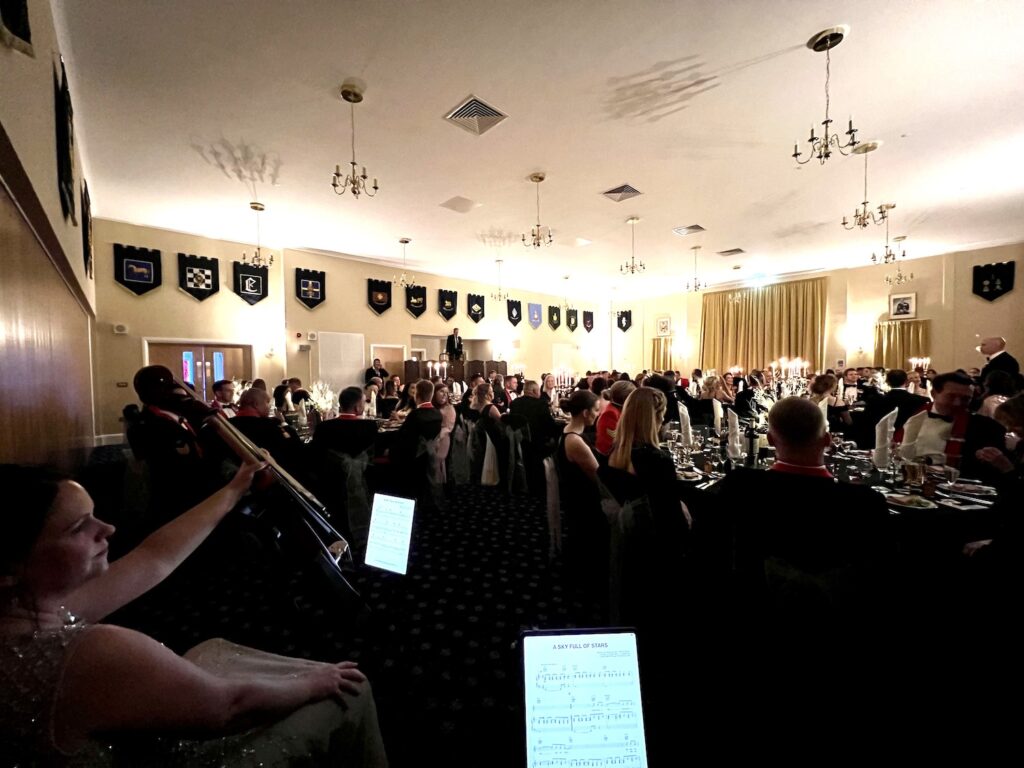Military dinners, whether formal Mess nights, regimental dinners, or commemorative banquets, are an integral part of British Army tradition. They are steeped in ceremonial protocol, camaraderie, and heritage, blending formality with fraternity. While uniforms, protocol, and customs are visible symbols of military cohesion, one often understated but powerful element is the presence of live background music. Whether performed by military bands, civilian ensembles, or solo instrumentalists, live background music enriches these events with atmosphere, emotional depth, and cultural resonance. In the setting of a British Army barracks or mess, live music offers far more than entertainment; it provides a sonic backdrop that enhances tradition, reinforces esprit de corps, and fosters an environment of dignity and connection.
Tradition and Ceremonial Significance
Military life is synonymous with tradition, and the British Army is renowned for its ceremonial customs. Music has historically been a cornerstone of military tradition—from bugle calls to marching bands—and live music at a formal dinner continues this legacy. The inclusion of background music during a military dinner connects present-day service personnel with a long lineage of soldiers, officers, and veterans who have shared similar experiences.
For centuries, British military bands have performed at dinners, often playing regimental marches or pieces associated with historic campaigns. When a live musician or ensemble subtly weaves these melodies into a dinner setting, it deepens the sense of history and continuity. Even when a civilian duo or ensemble is employed, they can adapt their repertoire to include arrangements of traditional military tunes or classical pieces, thus respecting the cultural expectations of the Mess environment.
Live music, in this context, acts as a modern extension of historical practice. It bridges the gap between the ceremonial and the personal, providing a gentle reminder that the gathering is part of something greater than just a meal—it is part of a legacy.
Atmosphere and Ambience
Perhaps the most immediate and perceptible value of live music during a military dinner lies in its contribution to atmosphere. The setting of a formal Mess dinner is meant to be elegant, respectful, and refined. Live background music supports this ambiance far more effectively than recorded music. It is dynamic, responsive, and organic. Musicians can adjust their tempo, volume, and style in real time, attuned to the flow of conversation, speeches, or toasts.
For instance, during the pre-dinner drinks or arrival period, a pianist or acoustic duo can play light classical or jazz standards, offering a refined and welcoming tone. During the meal, more subdued and lyrical pieces can provide a calming backdrop without intruding upon conversation. The choice of repertoire can also reflect the makeup of the attendees—whether it’s a regimental dinner with serving personnel, a commemorative function with veterans, or a mixed gathering including civilian guests and families.
Live music can soften the formal edge of a military event, encouraging relaxation and conversation while still maintaining a sense of decorum. It elevates the mood, subtly reminding guests that this is a special occasion, worthy of thoughtful presentation.

Esprit de Corps and Morale
The importance of morale in military life cannot be overstated. Dinners and social events are a vital way to nurture camaraderie, to reinforce bonds between individuals and units, and to give personnel a moment of reprieve from the rigours of service life. Live music plays a unique role in this morale-building process.
By setting an emotional tone, music can foster a sense of unity and shared experience. A familiar tune or regimental march performed live can spark pride, nostalgia, or reflection. A gentle jazz ballad can soothe the nerves of a newly commissioned officer attending their first Mess dinner. A cheerful waltz or light classical piece can encourage conversation among attendees from different ranks and backgrounds.
Furthermore, the shared enjoyment of live performance creates a human connection—not only between the musicians and the audience, but among the attendees themselves. It reminds those present that, beyond their roles and ranks, they are part of a community. In this way, live music contributes to the invisible but deeply felt sense of esprit de corps that underpins effective military organisations.
Professionalism and Prestige
The presence of live musicians lends an air of professionalism and prestige to any event. In a military context, where precision and excellence are core values, the inclusion of live background music aligns perfectly with the ethos of the Army. A well-presented musical performance reflects the same attention to detail that is seen in polished uniforms, gleaming silverware, and precise drill movements.
When senior officers, dignitaries, or civilian guests attend a military dinner, the quality of presentation speaks volumes. Live music demonstrates a commitment to hospitality, sophistication, and tradition. It shows that care has been taken to craft an experience that is both memorable and respectful.
Moreover, employing live musicians—particularly skilled civilian ensembles or soloists familiar with military protocol—allows for a tailored performance. Musicians can take cues from event organisers, adapt to timing changes, and observe proper etiquette. This adaptability ensures that the music serves the event seamlessly, enhancing rather than detracting from proceedings.
Emotional Resonance and Memorial
Not all military dinners are purely celebratory. Some, such as regimental reunions, Remembrance dinners, or end-of-tour gatherings, carry emotional weight. In these moments, music becomes not just background but a tool of expression. A solo piano rendition of “Nimrod” from Elgar’s Enigma Variations, or a quiet arrangement of “The Last Post,” played live, can evoke powerful emotions—far more so than a recorded version ever could.
Live music gives space for reflection and memorial. It can accompany moments of silence, toasts to fallen comrades, or speeches honouring service and sacrifice. In such moments, the authenticity of live performance—its nuances, hesitations, and presence—resonates deeply with listeners.
This emotional resonance is vital in a military context, where service and sacrifice are lived realities. Music gives voice to sentiments that words may not fully capture. It binds individuals together in shared remembrance, offering comfort and dignity.
Encouraging Social Interaction and Relaxation
Military culture, while formal, also places a high value on fellowship. Mess dinners, while governed by protocol, are also spaces for building relationships and unwinding. Live music contributes to this delicate balance by filling silence without dominating the room, setting a tone that facilitates conversation, humour, and social ease.
Unlike recorded music, which can sometimes be too loud, impersonal, or repetitive, live background music can be finely tuned to suit the energy of the room. Musicians can read the crowd, adjusting their performance accordingly. If the room is buzzing with laughter and conversation, they can fade into the background. If the room is quiet or reflective, they can shift to more contemplative pieces.
This sensitivity enhances the guest experience, allowing attendees to relax, engage, and enjoy the evening in a way that aligns with military decorum.

Supporting Local Musicians and Civil-Military Relations
Many UK Army barracks and regiments are embedded within civilian communities. Employing local musicians for Mess functions and dinners not only adds quality to the event but also strengthens civil-military relations. It is a gesture of goodwill and mutual respect. Local musicians often take great pride in performing at such events, and their involvement can create a positive impression of the military within the wider community.
Moreover, regular collaboration with local music professionals ensures a high standard of performance while keeping costs manageable. Musicians with experience in military settings—such as wedding duos, classical soloists, or small jazz ensembles—often understand the unique balance of formality and subtlety required. Their presence enhances the event while reinforcing ties between the military and civilian spheres.
Adaptability and Variety
Another advantage of live music is its flexibility. Depending on the nature of the dinner—whether a regimental ball, an intimate dinner for senior officers, or a formal commemorative function—live musicians can adapt their style, instrumentation, and repertoire accordingly.
A piano and cello duo might perform light classical and film music at a formal officers’ dinner. A string quartet could accompany a more traditional regimental event. A jazz trio might offer smooth standards at a more relaxed social evening. This variety allows organisers to tailor the musical atmosphere precisely, aligning with the tone, audience, and objectives of the evening.
Additionally, live musicians can accommodate special requests, whether it’s a favourite piece of a departing officer, a national anthem for a foreign dignitary, or a surprise performance during a toast. This level of responsiveness is something pre-recorded music simply cannot offer.
Conclusion
Live background music during a military dinner at an Army barracks or Mess function is far more than a nicety—it is a vital element that enhances tradition, fosters morale, and elevates the event in ways that align deeply with military values. It connects attendees with history, supports ceremonial moments, encourages social interaction, and provides emotional depth. In doing so, it transforms a meal into a memorable and meaningful experience.
Whether performed by military bands, civilian duos, or classical soloists, live music enriches the military dining tradition. It reinforces the dignity of the occasion while humanising the experience for those in attendance. In the disciplined yet communal environment of the British Army, live music is the perfect companion—subtle, respectful, and profoundly impactful.
As the military continues to adapt and evolve, the enduring presence of live music at formal dinners stands as a testament to the timeless power of shared cultural experience. In an environment where respect, honour, and unity are paramount, live music has an irreplaceable role to play.



